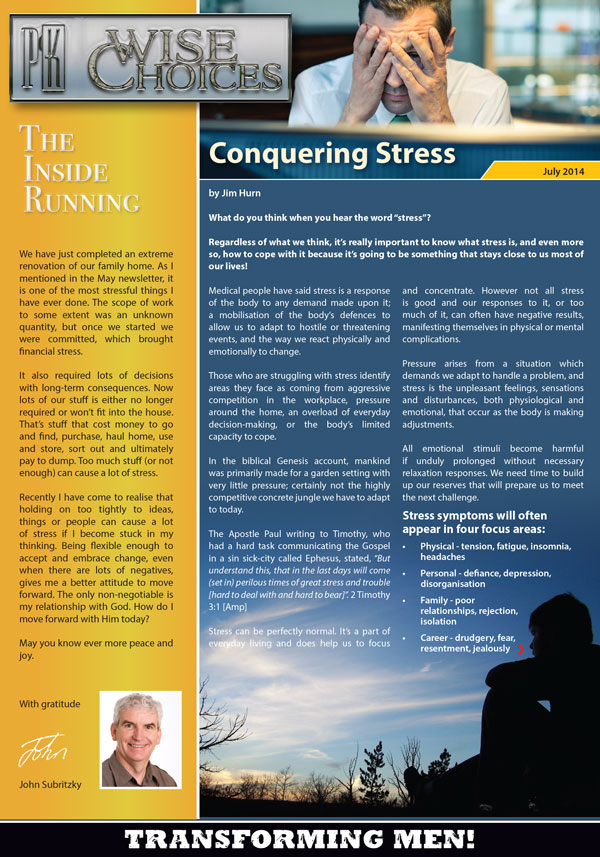What do you think when you hear the word “stress”?
Regardless of what we think, it’s really important to know what stress is, and even more so, how to cope with it because it’s going to be something that stays close to us most of our lives!
Medical people have said stress is a response of the body to any demand made upon it; a mobilisation of the body’s defences to allow us to adapt to hostile or threatening events, and the way we react physically and emotionally to change.
Those who are struggling with stress identify areas they face as coming from aggressive competition in the workplace, pressure around the home, an overload of everyday decision-making, or the body’s limited capacity to cope.
In the biblical Genesis account, mankind was primarily made for a garden setting with very little pressure; certainly not the highly competitive concrete jungle we have to adapt to today.
The Apostle Paul writing to Timothy, who had a hard task communicating the Gospel in a sin sick-city called Ephesus, stated, “But understand this, that in the last days will come (set in) perilous times of great stress and trouble [hard to deal with and hard to bear]”. 2 Timothy 3:1 [Amp]
Stress can be perfectly normal. It’s a part of everyday living and does help us to focus and concentrate. However not all stress is good and our responses to it, or too much of it, can often have negative results, manifesting themselves in physical or mental complications.
Pressure arises from a situation which demands we adapt to handle a problem, and stress is the unpleasant feelings, sensations and disturbances, both physiological and emotional, that occur as the body is making adjustments.
All emotional stimuli become harmful if unduly prolonged without necessary relaxation responses. We need time to build up our reserves that will prepare us to meet the next challenge.
 Stress symptoms will often appear in four focus areas:
Stress symptoms will often appear in four focus areas:
• Physical - tension, fatigue, insomnia, headaches
• Personal - defiance, depression, disorganisation
• Family - poor relationships, rejection, isolation
• Career - drudgery, fear, resentment, jealously
One area of living that is a weakness for some is their thought life, which is how they receive, interpret and label life’s experiences.
For example, your manager walks past your office and as he glances through your doorway you see him with a sour look on his face. Now, if you are fragile in your emotions and a little insecure in the workplace, you can easily interpret his “look” to mean you are doing an inadequate job and he will be back to follow you up. If your “observation default” has a negative bias like that, you will end up with a day full of worrying. What probably happened is that he ate his lunch too quickly and is suffering indigestion, and you are not even on his agenda. Interpreting the same look as his tiredness, or a dietary problem he is coping with, or some personal problem that has engaged his mind, is nowhere near as frightening.
We can’t remove stress from our lives but we can diminish its effects by improving the way we react to it. Always keep in mind that worry only produces more worry !
Promise Keepers has a check list of seven core beliefs that when adhered to help men walk in this world as followers of Jesus Christ with care and compassion. Promise No. 7 makes it very clear that we are to influence the environment we live in by being obedient to the Great Commandment (Mark 12:30-31) and the Great Commission (Matthew 28:19-20). This means living out the teachings of Jesus as revealed in the Bible and sharing the Good News of God’s salvation to all.
Quite a calling really, and only achievable by those who know how to cope with stress and live a balanced life.
So, how do we walk in this world of pressure and pain?
Here are some guidelines for the godly...
1. Keep healthy - physically fit, with deep breathing exercises
2. Set attainable goals and make commitments to achieve them
3. Be honest - integrity comes from being true to ourselves
4. Maintain a positive outlook on life, always thinking ahead
5. Stay clear of anger - keep good relationships with family and others
6. Stay connected to God and in tune with His will for our lives
“ ...Don’t let the world around you squeeze you into its own mould, but let God remould your minds from within, so that you may prove in practice that the plan of God for you is good, meets all his demands and moves towards the goal of true maturity” Romans 12:2 [Phillips]
The eminent Russian novelist Alexander Solzhenitsyn, recipient of the Nobel Prize in Literature in 1970, gave a profound answer to a question concerning problem living: "If I were called upon to identify briefly the principal trait of the entire 20th century, here too I would be unable to find anything more precise and pithy than to repeat once again that mankind have forgotten God."


